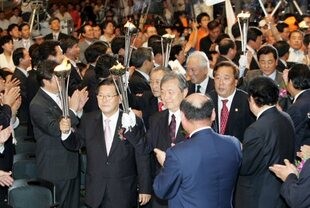hankyoreh
Links to other country sites 다른 나라 사이트 링크
How will historic inter-Korean summit impact the presidential election?

Will the second South-North summit significantly influence the presidential election slated for the end of the year?
The announcement of the historic summit was made as the nation’s main political parties gear up for their party primaries, with the summit scheduled to fall shortly after the main opposition Grand National Party primary and shortly before the pan-ruling camp holds its primary.
It is highly likely that the agenda discussed at the summit will emerge as one of the most important issues in the presidential election. In many respects, the second summit and the presidential election are inseparably related to each other. Political experts think that the upcoming summit will serve to buoy the pan-ruling camp and decrease the popularity of the GNP.
The economy has been the most important political issue in the presidential election until now. Lee Myung-bak, one of the two leading presidential hopefuls of the GNP, has maintained the highest popularity by stressing that he is an economic expert who has obtained excellent results [[[both as the mayor of Seoul and as the leader of a major corporation. Therefore, if the economy becomes the main issue in the presidential election, the GNP will lose nothing.
However, as the South and the North have decided to hold their second summit, the issue of peace on the peninsula is likely to emerge as an important political issue. The pan-ruling camp is familiar with the peace problem. The GNP, on the other hand, could face difficulties in dealing with the peace problem because it will inevitably have to consider its conservative supporters, who are less inclined to be open to inter-Korean cooperation or efforts to lay down the foundation for a peace regime.
The summit will be effective as a meeting between the leaders of the two Koreas but it could cause numerous other effects. Depending upon the results of the summit, the meeting could lead to a four-way summit between the two Koreas, the United States and China. It could also have a corresponding effect on international politics beyond the Korean peninsula, such as the conclusion of a peace treaty or the declaration of an end to the war.
If meaningful progress is made in the sector of South-North economic cooperation, the summit will be expanded to focus on economic issues beyond the peace problem. As the two leaders
Professor Kim Ho-ki of Yonsei University said, “The second summit could be the first step in solving the North Korean nuclear problem in the short term and will serve as a important turning point in establishing Northeast Asia’s peace regime in the middle and long-term. As people’s expectations for progress in inter-Korea relations rises, the summit will have a considerable ripple-effect on the soon-to-come presidential election.”
The pan-ruling camp expects the historic summit to influence people’s evaluation of the presidential candidates. Rep. Min Byeong-du of the Uri Party said, “If visible results are produced at the summit, we will approach the people with the logic that they should continue to move in that direction,” adding that there is no reason for the summit to be unfavorable to the pan-ruling camp.
The GNP is likely to stress that the summit will be used politically as a way to increase the liberal party’s standing in advance of the presidential election, rather than rejecting the summit itself. If the general public supports the GNP’s position, the summit could hit a snag. Former President Kim Dae-jung also pushed for a visit to Pyongyang ahead of provincial elections last year, but he gave up because the GNP continued to insinuate that Kim’s visit to the North could be used to manipulate the elections in the liberal camp’s favor. Even lawmakers from the pan-ruling camp agree that any attempts to use the second summit for political purposes will create a backlash. The first inter-Korean summit, which was announced just three days before the 16th general elections on April 13 in 2000, actually worked against the elections.
Editorial・opinion
![[Editorial] Does Yoon think the Korean public is wrong? [Editorial] Does Yoon think the Korean public is wrong?](https://flexible.img.hani.co.kr/flexible/normal/500/300/imgdb/original/2024/0417/8517133419684774.jpg) [Editorial] Does Yoon think the Korean public is wrong?
[Editorial] Does Yoon think the Korean public is wrong?![[Editorial] As it bolsters its alliance with US, Japan must be accountable for past [Editorial] As it bolsters its alliance with US, Japan must be accountable for past](https://flexible.img.hani.co.kr/flexible/normal/500/300/imgdb/original/2024/0417/6817133413968321.jpg) [Editorial] As it bolsters its alliance with US, Japan must be accountable for past
[Editorial] As it bolsters its alliance with US, Japan must be accountable for past- [Guest essay] Amending the Constitution is Yoon’s key to leaving office in public’s good graces
- [Editorial] 10 years on, lessons of Sewol tragedy must never be forgotten
- [Column] A death blow to Korea’s prosecutor politics
- [Correspondent’s column] The US and the end of Japanese pacifism
- [Guest essay] How Korea turned its trainee doctors into monsters
- [Guest essay] As someone who helped forge Seoul-Moscow ties, their status today troubles me
- [Editorial] Koreans sent a loud and clear message to Yoon
- [Column] In Korea’s midterm elections, it’s time for accountability
Most viewed articles
- 1[Column] The clock is ticking for Korea’s first lady
- 2Samsung barricades office as unionized workers strike for better conditions
- 3[Editorial] When the choice is kids or career, Korea will never overcome birth rate woes
- 4Why Israel isn’t hitting Iran with immediate retaliation
- 5[News analysis] After elections, prosecutorial reform will likely make legislative agenda
- 6[Editorial] Does Yoon think the Korean public is wrong?
- 7S. Korea, Japan reaffirm commitment to strengthening trilateral ties with US
- 8[Editorial] As it bolsters its alliance with US, Japan must be accountable for past
- 9Japan officially says compensation of Korean forced laborers isn’t its responsibility
- 10Faith in the power of memory: Why these teens carry yellow ribbons for Sewol